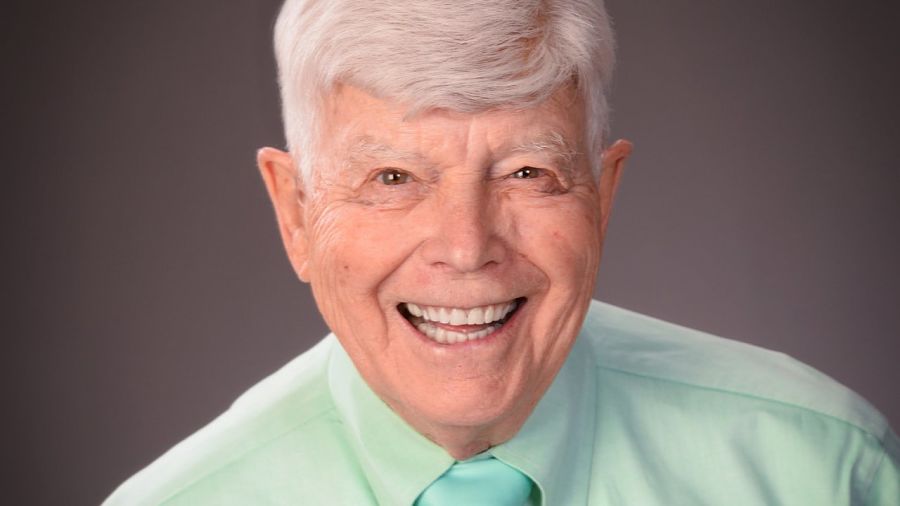Producer, director, and performer Fred C. Adams, who founded the Utah Shakespeare Festival, died on Feb. 6 at age 89.
I first met Fred C. Adams 49 years ago. I don’t know how it all happened, but what transpired over that near half century transformed not only my life, but thousands of artists and hundreds of thousands of theatregoers from around the world. Whether you knew him as producer, actor, artist, director, teacher, mentor, colleague, confidant, or friend—he was a trailblazer.
Fred was one of those pioneers of the American theatre who saw the vision of the emerging regional theatre movement and did something about it. He knew that Broadway professional theatre was not coming to the rural west, and he wanted to make certain that people were exposed to the transformative power of quality theatrical productions.
In 1961 he founded the Utah Shakespeare Festival in Cedar City, Utah, among the towering spires of Zion National Park and the majestic red rocks of Bryce Canyon National Park. He felt that the universal messages of Shakespeare would resonate in such glorious natural surroundings. He spoke with the likes of Zelda Fichlander, Tyrone Guthrie, Oscar Brockett, Jon Jory, Angus Bowmer, and others about his dream of creating a Festival where audiences would enjoy “Shakespeare Under the Stars.”
The 1960s represented a perfect decade for Fred and his dream. He represented change—positive change, good change, kind and thoughtful change. Fred always looked up, reached higher, and dreamed bigger with the belief that theatre elevated the world. He believed theatre had the ability to make people smile, feel included, and be inspired. People made him truly happy and made him the “force of nature” that he was. Fred was a collector of people.
Through his tenacious spirit and steadfast passion, his dream of creating a home for live professional theatre in the rural west became a reality. His role as Utah Shakespeare Festival ambassador took him to incredible places and meetings with people at home and abroad. It didn’t matter whether it was in a classroom of university students, where he taught for 38 years, or a large group of corporate executives; Fred would have them spell-bound. His words painted pictures of what could be, not what was.
He was as comfortable on a Broadway stage or lobbying the halls of the United States Capitol for additional arts funding as he was conversing with his children and grandchildren from his kitchen table at home. He was at ease because the themes of Shakespeare were infused into his everyday life. He understood the importance to connect, be loved, feel sorrow, and acknowledge the foibles of being human. He had learned those lessons as a young boy from his mother, who taught him Romeo and Juliet and Hamlet.
Fred believed that humans dream their greatest dreams when surrounded by beauty. Today his dream represents three theatres, full production studios, a Shakespeare statuary garden, art museum, and a full-time and seasonal company of more than 300 theatre artisans. Fred worked his entire life building his dream, but he didn’t do it alone and was quick to acknowledge that fact. He would say, “Hire the best people and then get out of their way. Trust those you respect to do their job.” He believed the artists of his company wove the fabric that made the tapestry quilt of the Utah Shakespeare Festival.
His crowning glory came in 2000 when the Utah Shakespeare Festival received the coveted Tony Award for Outstanding Regional Theatre. The trailblazing pioneer’s theatre had been recognized for its place in U.S. theatre.
In the last couple years of his life, Fred’s pioneering spirit didn’t wane but merely transitioned. He felt he had reached a point in his life where his colleagues would protect his Festival legacy. He wanted to find avenues to help others through kindness and civility. He was deeply concerned that we had lost our way. He felt strongly that people needed to respect one another even if they didn’t agree. He believed humankind is stronger when we find common ground through civil discourse. He wanted us to talk to each other face to face, engage in what matters, and learn from the lessons of Shakespeare.
Fred never shied away from a challenge. His entire life he searched for opportunities to make a difference. He would leap at a chance to learn more, dig deeper, reach higher, or run faster. This quote from Julius Caesar is a reflection of his life: “Bid me run, and I will strive with things impossible.” He did strive for things impossible and made it possible for hundreds of thousands to experience quality professional theatre in rural southern Utah.
Fred was my teacher, mentor, colleague, best friend…my North Star, and I will always look to the heavens for him to provide guidance.
R. Scott Phillips, executive director of the Utah Shakespeare Festival from 2007 to 2017, held a number of positions at the company since 1977, when he became the organization’s first full-time employee.


